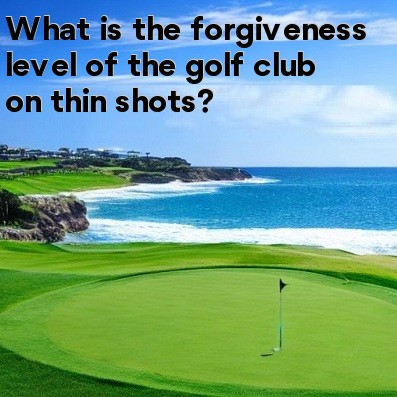
Forgiveness Level of Golf Clubs on Thin Shots
When it comes to golf, one of the factors that greatly affects a player's shot is the forgiveness level of the golf club. Different golf clubs have varying forgiveness levels, and this becomes particularly important when it comes to thin shots. A thin shot, also known as a skim or a duff, is when the clubhead strikes the ball too high on the face, resulting in reduced contact and distance. Let's explore how forgiveness plays a role in handling thin shots.
1. Blade Irons:
- Blade irons are known for their sleek design and thin topline.
- Due to their lack of perimeter weighting, blade irons tend to have low forgiveness on thin shots.
- When you hit a thin shot with a blade iron, the lack of forgiveness amplifies the negative impact on distance and accuracy.
2. Cavity Back Irons:
- Cavity back irons have a larger sweet spot and more forgiveness compared to blade irons.
- When you hit a thin shot with a cavity back iron, the club's design helps to retain some distance and accuracy.
- The perimeter weighting of cavity back irons helps to distribute the impact of a thin shot across a larger area of the clubface.
3. Hybrid Clubs:
- Hybrid clubs are a great choice for players who struggle with thin shots.
- The forgiveness level of hybrid clubs on thin shots is quite high due to their wider sole and lower center of gravity.
- When you hit a thin shot with a hybrid club, the design allows for better clubhead-to-ball contact and minimizes distance loss.
4. Oversized Drivers:
- Oversized drivers come with large clubheads and forgiving faces.
- They are designed to help players achieve maximum distance and minimize the negative effects of off-center hits, including thin shots.
- The large sweet spot of an oversized driver provides forgiveness even on thin shots, resulting in better distance and accuracy.
5. Fairway Woods:
- Fairway woods typically offer good forgiveness on thin shots.
- Their wider clubfaces and lower centers of gravity help to generate sufficient ball contact and maintain decent distance.
- However, it is worth noting that forgiveness levels may vary between different fairway wood models.
Remember, the forgiveness level of a golf club on thin shots plays a significant role in determining your overall shot quality and performance. Consider your skill level, playing style, and personal preferences when selecting the right golf club for your game.
Always strive to improve your swing technique to minimize thin shots, and practice regularly to develop consistency and accuracy in your shots. The more consistent your ball-striking becomes, the less you will have to rely solely on the forgiveness of your golf clubs.





